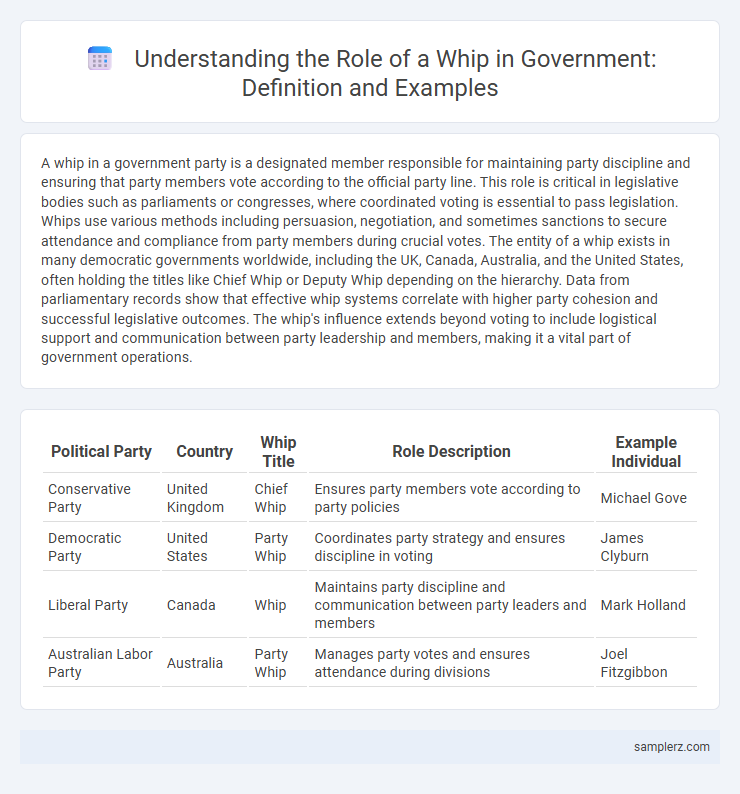A whip in a government party is a designated member responsible for maintaining party discipline and ensuring that party members vote according to the official party line. This role is critical in legislative bodies such as parliaments or congresses, where coordinated voting is essential to pass legislation. Whips use various methods including persuasion, negotiation, and sometimes sanctions to secure attendance and compliance from party members during crucial votes. The entity of a whip exists in many democratic governments worldwide, including the UK, Canada, Australia, and the United States, often holding the titles like Chief Whip or Deputy Whip depending on the hierarchy. Data from parliamentary records show that effective whip systems correlate with higher party cohesion and successful legislative outcomes. The whip's influence extends beyond voting to include logistical support and communication between party leadership and members, making it a vital part of government operations.
Table of Comparison
| Political Party | Country | Whip Title | Role Description | Example Individual |
|---|---|---|---|---|
| Conservative Party | United Kingdom | Chief Whip | Ensures party members vote according to party policies | Michael Gove |
| Democratic Party | United States | Party Whip | Coordinates party strategy and ensures discipline in voting | James Clyburn |
| Liberal Party | Canada | Whip | Maintains party discipline and communication between party leaders and members | Mark Holland |
| Australian Labor Party | Australia | Party Whip | Manages party votes and ensures attendance during divisions | Joel Fitzgibbon |
Definition and Role of the Party Whip
The party whip is an official responsible for enforcing party discipline and ensuring members attend and vote according to party lines during legislative sessions. They coordinate communication between party leadership and members, track voting intentions, and mobilize support for key policies. The whip's role is crucial in maintaining party unity and facilitating the smooth passage of government legislation.
Historical Development of Party Whip Systems
The historical development of party whip systems can be traced back to the 19th-century British Parliament, where whips played a crucial role in maintaining party discipline and ensuring legislative attendance. Over time, the practice spread to other parliamentary democracies such as Canada, Australia, and India, evolving to include formalized roles and communication methods within political parties. This evolution reflects the increasing complexity of party politics and the need for coordinated policy enforcement across government institutions.
Key Duties of a Party Whip
A Party Whip is responsible for ensuring party discipline by managing members' attendance and voting behavior during legislative sessions. They act as a liaison between party leadership and members to communicate policy positions and strategies. Monitoring internal party consensus and reporting potential dissent helps maintain cohesion and advance the party's legislative agenda.
Famous Examples of Whip Actions in Parliament
In the UK Parliament, the role of the Chief Whip has been pivotal during key votes, such as the 2019 Brexit divisions where strict party discipline ensured the passage of critical legislation. In the United States, the House Majority Whip plays a crucial part in rallying party members for budget approvals and significant policy decisions. Australia's Senate Whips have famously managed tight votes on environmental legislation, illustrating the strategic importance of whip actions in maintaining party cohesion.
How Whips Influence Party Discipline
Whips in government ensure party discipline by coordinating voting strategies and communicating leadership's expectations to members. They monitor attendance and persuade dissenting legislators to align with party policies through negotiation and incentives. Effective whips maintain legislative cohesion, critical for passing bills and sustaining party unity.
Notable Instances of Whip Enforcement
Notable instances of whip enforcement in government parties include the 2019 UK Conservative Party Brexit votes, where MPs faced implications for defying the party line, and the 2021 Indian Lok Sabha session, where the BJP government issued strict whips to ensure quorum during crucial bills. Whip enforcement ensures party discipline in legislative voting, affecting attendance, voting behavior, and overall government stability. Such enforcement is critical in closely contested parliaments, impacting legislative outcomes and party cohesion.
The Impact of Whip Directives on Legislation
Whip directives in government parties significantly shape legislative outcomes by ensuring party members vote according to leadership strategies, thereby streamlining the passage of key bills. These instructions maintain party discipline, influencing the alignment of parliamentary votes with the government's agenda and reducing dissent during crucial legislative sessions. The effectiveness of whip systems directly impacts policy implementation, legislative stability, and government cohesion in parliamentary democracies.
Whip Systems in Different Government Structures
Whip systems vary significantly across government structures, with parliamentary systems like the UK employing party whips to enforce discipline and secure votes on legislation. In presidential systems such as the United States, whips in the House and Senate coordinate party strategy and ensure member attendance while respecting greater individual autonomy. Hybrid systems often blend these approaches, tailoring whip roles to balance centralized control and representative independence.
Challenges Faced by Party Whips
Party whips in government encounter challenges such as managing dissent within the party ranks, ensuring attendance for critical votes, and maintaining party discipline under intense political pressure. They must balance the diverse interests of party members while navigating competing agendas and factionalism. These obstacles complicate the whip's role in securing legislative cohesion and effective policy implementation.
Case Studies: Successful and Failed Whip Operations
In the 1990 UK Conservative Party leadership vote, Chief Whip Sir Michael Spicer successfully secured the party's support by coordinating disciplined voting strategies, illustrating effective whip operations in managing internal dissent. Conversely, the 2019 Brexit Party rebellion saw failed whip enforcement when Conservative MPs defied party lines, leading to significant legislative setbacks. These case studies highlight the critical role of whip effectiveness in maintaining party cohesion and influencing parliamentary outcomes.

example of whip in party Infographic
 samplerz.com
samplerz.com